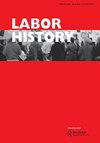从“善良”到“劣等”:19世纪60年代至80年代意大利农民的代表
IF 0.7
4区 管理学
Q1 HISTORY
引用次数: 0
摘要
摘要本文通过对大量已发表和未发表的资料的分析,重构了从统一时期到19世纪80年代土地危机期间,意大利统治精英(尤其是农民)对农村世界的表述和叙述。在这个关键的转型时期,农民作为古代美德的宝库的理想化版本被另一个版本所取代,这在农村阶级身上投下了生物自卑的阴影。我认为,除了社会主义的发展,以及主要在北方农村地区实施资本主义制度的经济、政治和社会变革之外,这一过程还源于当时在社会中传播的隆布罗斯思想的影响。对这一转变的分析揭示了19世纪意大利统治阶级的历史,突出了社会的反动观点和阶级意识。本文章由计算机程序翻译,如有差异,请以英文原文为准。
From ‘virtuous’ to ‘subhuman’: representations of Italian peasants between the 1860s and the 1880s
ABSTRACT This article reconstructs the representations and narratives of the rural world produced by the Italian dominant elite, especially the agrarian, during the period from Unification to the agrarian crisis of the 1880s, through the analysis of numerous published and unpublished sources. During this crucial period of transition, the idealized version of the peasant as a repository of ancient virtue was replaced by another, which cast the shadow of biological inferiority over the rural class. I argue that this process resulted from the influence of Lombrosian ideas then spreading through the society, in addition to the growth of socialism, and the economic, political, and social changes underway primarily in the north, where rural areas saw the implementation of a capitalist system. The analysis of this transformation sheds new light on the history of the Italian ruling class of the 1800s, highlighting the reactionary views and class-consciousness of the society.
求助全文
通过发布文献求助,成功后即可免费获取论文全文。
去求助
来源期刊

Labor History
Multiple-
CiteScore
1.00
自引率
28.60%
发文量
44
期刊介绍:
Labor History is the pre-eminent journal for historical scholarship on labor. It is thoroughly ecumenical in its approach and showcases the work of labor historians, industrial relations scholars, labor economists, political scientists, sociologists, social movement theorists, business scholars and all others who write about labor issues. Labor History is also committed to geographical and chronological breadth. It publishes work on labor in the US and all other areas of the world. It is concerned with questions of labor in every time period, from the eighteenth century to contemporary events. Labor History provides a forum for all labor scholars, thus helping to bind together a large but fragmented area of study. By embracing all disciplines, time frames and locales, Labor History is the flagship journal of the entire field. All research articles published in the journal have undergone rigorous peer review, based on initial editor screening and refereeing by at least two anonymous referees.
 求助内容:
求助内容: 应助结果提醒方式:
应助结果提醒方式:


